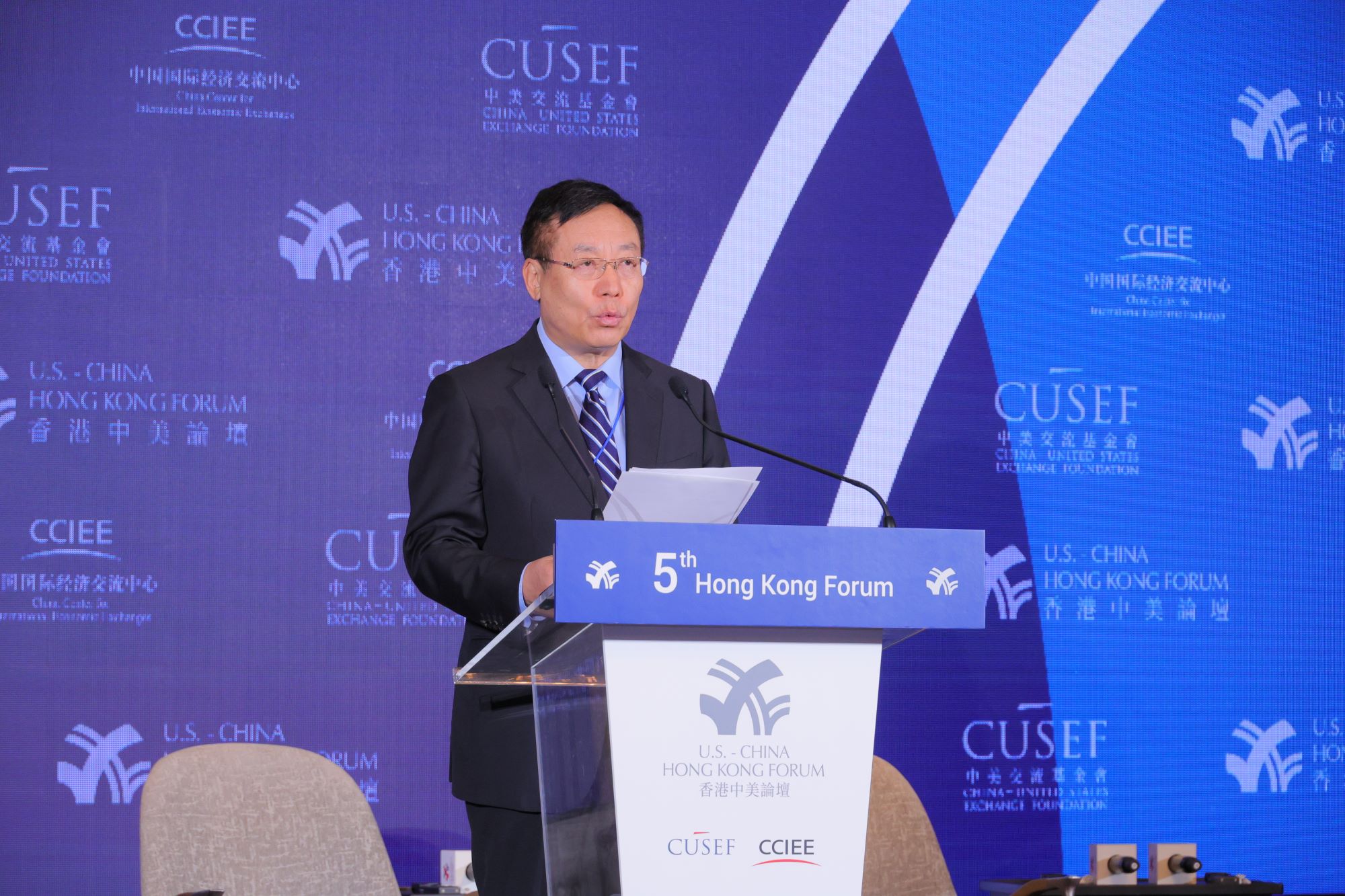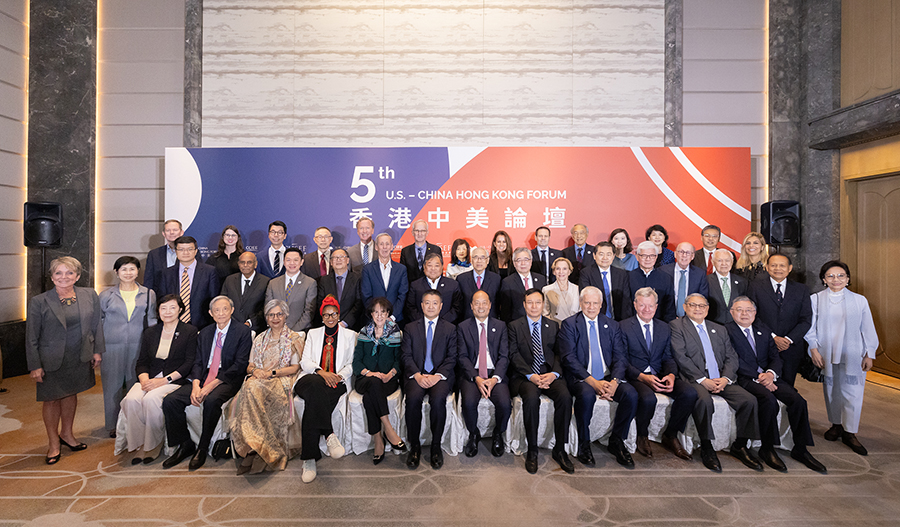U.S. & China Ambassadors, Heads of State, and Global Experts Convene to Address Bilateral Challenges and Opportunities for Cooperation
Esteemed international dignitaries gathered today for discussions and dialogues on the U.S.-China relationship during the opening day of the 2024 U.S.-China Hong Kong Forum. Hosted by the China-United States Exchange Foundation (CUSEF) in partnership with the China Center for International Economic Exchanges (CCIEE), the Forum is the first global event on the bilateral relationship since the U.S. presidential election. This year’s theme, aptly titled Reflection and Forecast, emphasizes the need to review past progress and set a forward-looking agenda for bilateral cooperation on shared challenges.
Opening the Forum, Xie Feng, China’s Ambassador to the U.S., remarked, “Going forward, the relationship is again at a new historical starting point. Both our peoples and the world are watching closely where it will head…While China and the United States each have our own concerns, we can well put the issues on the table, have candid communication and find a solution through equal footed consultation...The two sides need to let dialogue and win-win results define our interactions, not confrontation or zero-sum mentality.”
His counterpart, Nicholas Burns, U.S. Ambassador to China, added, “Our two governments have an obligation to manage the bilateral relationship in an effective way. But it is the Chinese and American people from all walks of life — students, business people, young professionals, musicians, artists, athletes, academics — they're the ballast in the ties between our two countries. As we look to 2025, we in U.S. Mission China will work to support the incoming administration of President-elect Donald Trump, to help him and his new team to succeed in this complicated, complex and yet vital relationship with China.”
Muhammad Yunus, interim leader of Bangladesh and Nobel Peace Prize winner, addressed the Forum for a second consecutive year. He urged both China and the U.S. to embrace their influence as "natural leaders of the international community," emphasizing that their collaboration is essential to tackling global challenges. Against the backdrop of Bangladesh’s ongoing transformation, Yunus appealed to both countries to "secure the global future" by inspiring a worldwide commitment to their example of moral leadership.
Bi Jingquan, Chairman of CCIEE, said “We hope that, built on a foundation of mutual respect, our two nations will continue to resolve differences and manage disputes through dialogue, consultation, and negotiation. We also hope that both countries will promote mutually beneficial cooperation in key areas, strengthening collaboration in traditional sectors such as agriculture, energy, pharmaceuticals, and finance, while exploring new avenues in emerging fields like the digital economy, advanced manufacturing, and green, low-carbon development. Furthermore, we hope that China and the U.S. will enhance their coordination in international affairs, deepening their cooperation in multilateral arenas such as climate change, cybersecurity, and public health. Together, we can safeguard the security and resilience of global industrial and supply chains, while jointly upholding the multilateral cooperation mechanisms centered around the United Nations.”
John Zhao, Chairman of CUSEF, said, “We're gathering here at an important moment, just 10 days after the very consequential U.S presidential election. Dialogue and cooperation between the peoples of U.S and China at all levels are more important than ever. This Forum is a platform for honest and constructive conversations that aim to foster mutual understanding and mutual trust. This is our opportunity to contribute to a peaceful and constructive U.S-China relationship.”
James Chau, President of CUSEF, welcomed guests, saying, "The U.S.-China Hong Kong Forum is not a conference, but an annual working meeting, where global leaders meet in Hong Kong — the international center for finance, commerce, and the arts — to shape the greatest bilateral relationship. Not only do we have more women in leadership roles represented at this Forum, and the first ever youth program attached to this annual meeting, we also have speakers from Europe, Asia, Latin America, and Africa. We also welcome new partners such as the World Economic Forum attending this meeting for the first time. And we are deeply honored to have representatives from three U.S. presidential families."
Lu Kang, Vice Minister, International Department, CPC Central Committee, discussed how China's commitment to maintain a stable, healthy, sustainable bilateral relationship has never changed in spite of difficulties. China has worked to forge joint efforts for the benefit not only of our two peoples, but the world.
Charlene Barshefsky, Chair of the National Committee on U.S.-China Relations and the 12th U.S. Trade Representative, said, “There are many things we can say about the current situation, but none I think more important than the two countries must find a way to get back on track. It's in the best interest of both countries, of the people of both countries, of the world for stability, for business, and for peace.
The day’s high-level dialogues explored the significance of people-to-people exchanges, the future of bilateral trade, and opportunities for enduring peace through collaboration on health and climate initiatives. Highlights also included a masterclass on "The Art of Listening," led by Carla Canales — Arts Envoy with the President's Committee for Arts and the Humanities and the U.S. State Department — and a focus on youth engagement, as the Forum welcomed students from esteemed institutions such as Tsinghua University, Peking University, and New York University, among others.
A special tribute was also held in honor of President Jimmy Carter and the late Dr. Henry Kissinger, an Honorary Advisor of CUSEF from its founding in 2008, two key figures in the establishment of diplomatic ties between the U.S. and China. Carter’s dedication to peace, human rights, and his efforts as the architect of a new era in U.S.-China relations, and Kissinger’s legacy as a pioneer in U.S.-China diplomacy and a defining figure in global foreign policy, were celebrated as cornerstones in the history of bilateral engagement.
The second day of the Forum will feature closed-door, off-the-record roundtables, providing a platform for in-depth, solution-oriented discussions among select leaders on complex issues including trade, security, climate, and more.

John Zhao Chairman, CUSEF

Bi Jingquan Chairman, CCIEE; former Commissioner, China Food and Drug Administration
James Chau President, CUSEF; WHO Goodwill Ambassador
